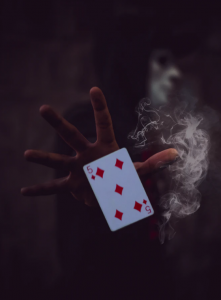Selective Attention, the Mind and Magic
It has been said that the human brain is the most complicated piece of matter in the known universe. That may be true. However, it is also flawed. And thank heaven for that. For a large part of magic consist of exploiting the imperfections in thinking and perception for which all human beings are burdened. In this post, I will describe some of these flaws – without giving away specific trade secrets – and how neuroscience aids us magicians.
How Selective Attention Works
At any given moment of our lives we are overwhelmed by a barrage of sensory information. Examples of this include car horns, background chatter, bird chirping in nature, etc. The mind blocks out some of these stimuli and instead focuses on the most important elements of a given situation. “In order to sustain our attention to one event in everyday life, we must filter out other events,” explains author Russell Revlin in his text Cognition: Theory and Practice. We magicians aim to direct the attention of our audiences to where we desire it be. Once this control is exerted, we can manipulate it so that perception is changed.
Magicians and Memory
Another cognitive function that magicians seek to manipulate is that of memory. Memory is a very complicated process in the brain. For example, it has been shown by behavioral scientists that if a person is provided with misinformation about past events, his/her mind can even create false memories in an attempt to achieve consistency. We magicians use the fact that we are very familiar with our tricks from beginning to end. In contrast, our spectators will often miss details. This can lead to them filling in details that were not there.
The Bond between Neuroscience and Magic
So intimate is the link between how the mind works and how a strolling magician and Manhattan mentalist like me perform his feat, that some famous magicians such as Mac King, James Randi, Apollo Robbins, Teller, John Thompson have contributed to the works of neuroscientists such as Stephen L. Macknik, Susana Martinez-Conde. This bond helps both scholars and artists in understanding the extremely complex human brain.
In other words, our audiences are just as important at making what we do special as we magicians are. Their contribution is how the human brain functions. You can witness and become a part of one my performances by booking me through my site. Hope to see you soon.



